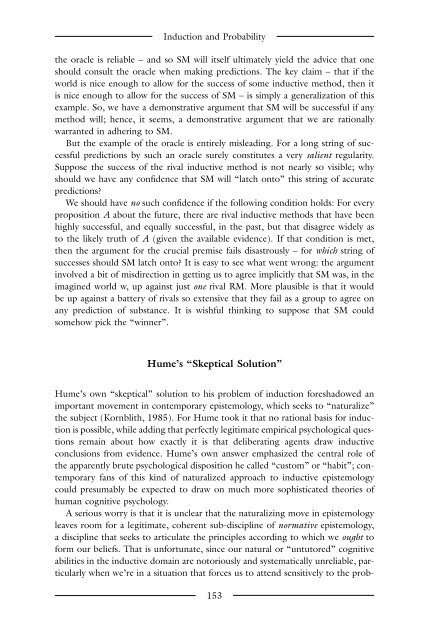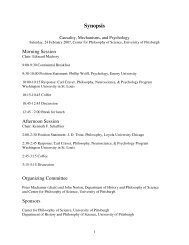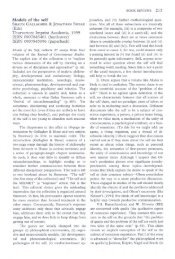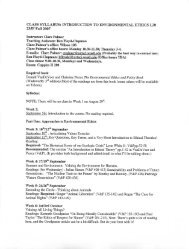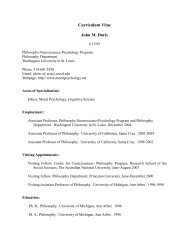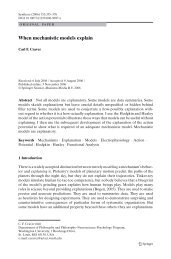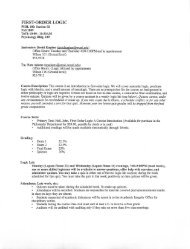The Blackwell Guide to the Philosophy of Science - The Department ...
The Blackwell Guide to the Philosophy of Science - The Department ...
The Blackwell Guide to the Philosophy of Science - The Department ...
You also want an ePaper? Increase the reach of your titles
YUMPU automatically turns print PDFs into web optimized ePapers that Google loves.
Induction and Probability<br />
<strong>the</strong> oracle is reliable – and so SM will itself ultimately yield <strong>the</strong> advice that one<br />
should consult <strong>the</strong> oracle when making predictions. <strong>The</strong> key claim – that if <strong>the</strong><br />
world is nice enough <strong>to</strong> allow for <strong>the</strong> success <strong>of</strong> some inductive method, <strong>the</strong>n it<br />
is nice enough <strong>to</strong> allow for <strong>the</strong> success <strong>of</strong> SM – is simply a generalization <strong>of</strong> this<br />
example. So, we have a demonstrative argument that SM will be successful if any<br />
method will; hence, it seems, a demonstrative argument that we are rationally<br />
warranted in adhering <strong>to</strong> SM.<br />
But <strong>the</strong> example <strong>of</strong> <strong>the</strong> oracle is entirely misleading. For a long string <strong>of</strong> successful<br />
predictions by such an oracle surely constitutes a very salient regularity.<br />
Suppose <strong>the</strong> success <strong>of</strong> <strong>the</strong> rival inductive method is not nearly so visible; why<br />
should we have any confidence that SM will “latch on<strong>to</strong>” this string <strong>of</strong> accurate<br />
predictions?<br />
We should have no such confidence if <strong>the</strong> following condition holds: For every<br />
proposition A about <strong>the</strong> future, <strong>the</strong>re are rival inductive methods that have been<br />
highly successful, and equally successful, in <strong>the</strong> past, but that disagree widely as<br />
<strong>to</strong> <strong>the</strong> likely truth <strong>of</strong> A (given <strong>the</strong> available evidence). If that condition is met,<br />
<strong>the</strong>n <strong>the</strong> argument for <strong>the</strong> crucial premise fails disastrously – for which string <strong>of</strong><br />
successes should SM latch on<strong>to</strong>? It is easy <strong>to</strong> see what went wrong: <strong>the</strong> argument<br />
involved a bit <strong>of</strong> misdirection in getting us <strong>to</strong> agree implicitly that SM was, in <strong>the</strong><br />
imagined world w, up against just one rival RM. More plausible is that it would<br />
be up against a battery <strong>of</strong> rivals so extensive that <strong>the</strong>y fail as a group <strong>to</strong> agree on<br />
any prediction <strong>of</strong> substance. It is wishful thinking <strong>to</strong> suppose that SM could<br />
somehow pick <strong>the</strong> “winner”.<br />
Hume’s “Skeptical Solution”<br />
Hume’s own “skeptical” solution <strong>to</strong> his problem <strong>of</strong> induction foreshadowed an<br />
important movement in contemporary epistemology, which seeks <strong>to</strong> “naturalize”<br />
<strong>the</strong> subject (Kornblith, 1985). For Hume <strong>to</strong>ok it that no rational basis for induction<br />
is possible, while adding that perfectly legitimate empirical psychological questions<br />
remain about how exactly it is that deliberating agents draw inductive<br />
conclusions from evidence. Hume’s own answer emphasized <strong>the</strong> central role <strong>of</strong><br />
<strong>the</strong> apparently brute psychological disposition he called “cus<strong>to</strong>m” or “habit”; contemporary<br />
fans <strong>of</strong> this kind <strong>of</strong> naturalized approach <strong>to</strong> inductive epistemology<br />
could presumably be expected <strong>to</strong> draw on much more sophisticated <strong>the</strong>ories <strong>of</strong><br />
human cognitive psychology.<br />
A serious worry is that it is unclear that <strong>the</strong> naturalizing move in epistemology<br />
leaves room for a legitimate, coherent sub-discipline <strong>of</strong> normative epistemology,<br />
a discipline that seeks <strong>to</strong> articulate <strong>the</strong> principles according <strong>to</strong> which we ought <strong>to</strong><br />
form our beliefs. That is unfortunate, since our natural or “untu<strong>to</strong>red” cognitive<br />
abilities in <strong>the</strong> inductive domain are no<strong>to</strong>riously and systematically unreliable, particularly<br />
when we’re in a situation that forces us <strong>to</strong> attend sensitively <strong>to</strong> <strong>the</strong> prob-<br />
153


